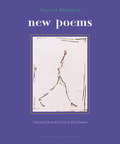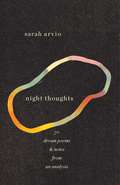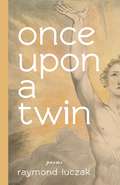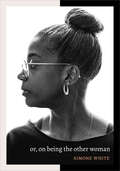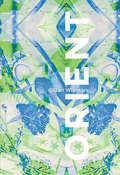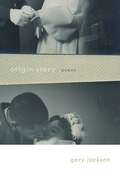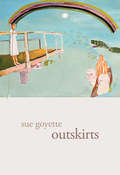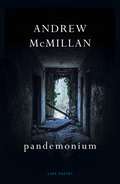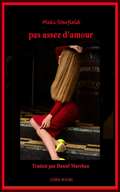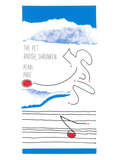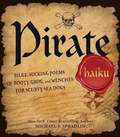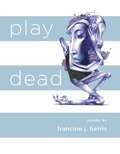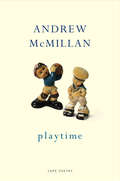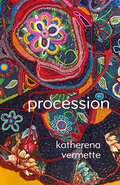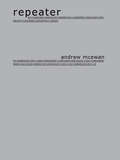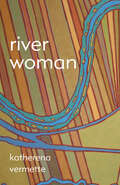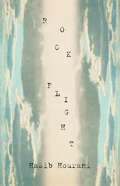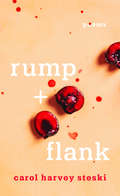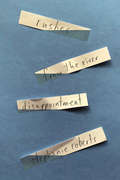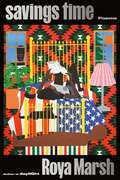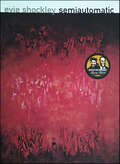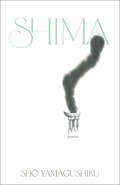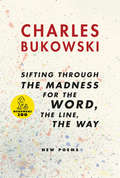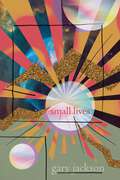- Table View
- List View
new poems
by Bill Johnston Tadeusz RozewiczWritten in a pared-down, direct language, and filled with allusions to everything from philosophy to TV talk shows, the poetry of Tadeusz Rózewicz encompasses the complexity of human experience in the early 21st century. Rózewicz's unique voice, formed during his experiences as a member of the Polish resistance in World War II, and honed by decades living under communist rule, holds a merciless mirror up to the crimes and excesses of the poet's lifetime. In his eighties now, Rózewicz continues to be a prolific writer and an acerbic commentator on his life and times. This collection combines his latest three volumes: professor's knife, gray zone, and exit. These are extraordinary poems from an acknowledged European master.
night thoughts: 70 dream poems & notes from an analysis
by Sarah ArvioIn this remarkable and unique work, award-winning poet Sarah Arvio gives us a memoir about coming to terms with a life in crisis through the study of dreams. As a young woman, threatened by disturbing visions, Arvio went into psychoanalysis to save herself. The result is a riveting sequence of dream poems, followed by "Notes." The poems, in the form of irregular sonnets, describe her dreamworld: a realm of beauty and terror emblazoned with recurring colors and images--gold, blood red, robin's-egg blue, snakes, swarms of razors, suitcases, playing cards, a catwalk. The Notes, also exquisitely readable, unfold the meaning of the dreams--as told to her analyst--and recount the enlightening and sometimes harrowing process of unlocking memories, starting with the diaries she burned to make herself forget. Arvio's explorations lead her back to her younger self--and to a life-changing understanding that will fascinate readers. An utterly original work of art and a groundbreaking portrayal of the power of dream interpretation to resolve psychic distress, this stunning book illumines the poetic logic of the dreaming mind; it also shows us, with surpassing poignancy, how tender and fragile is the mind of an adolescent girl.
once upon a twin: poems
by Raymond LuczakWhen Raymond Luczak was growing up deaf in a hearing Catholic family of nine children, his mother shared conflicting stories about having had a miscarriage after—or possibly around—the time he was conceived. As an elegy to his lost twin, this book asks: If he had a twin, just how different would his life have been?
or, on being the other woman
by Simone WhiteIn or, on being the other woman, Simone White considers the dynamics of contemporary black feminist life. Throughout this book-length poem, White writes through a hybrid of poetry, essay, personal narrative, and critical theory, attesting to the narrative complexities of writing and living as a black woman and artist. She considers black social life—from art and motherhood to trap music and love—as unspeakably troubling and reflects on the degree to which it strands and punishes black women. She also explores what constitutes sexual freedom and the rewards and dangers that come with it. White meditates on trap music and the ways artists such as Future and Meek Mill and the sonic waves of the drum machine convey desire and the black experience. Charting the pressures of ordinary black womanhood, White pushes the limits of language, showing how those limits can be the basis for new modes of expression.
orient
by Gillian Wigmoreorient is the third collection from one of Western Canada's most accomplished poets. Composed mainly of three long poems—an extended meditation on the connection between man and fish, the lament of a big-souled cowboy poet looking up from rock bottom, and a historical envisioning of an intimate relationship between a pioneer and a powerful crone—orient leaps, sings, burrows down, and orients the reader within its rich ecosystem. The appeal of these poems lies partly in their blend of humility (the open-minded approach), in their force (the taut style, the original vision) and in an astonishing boldness. Wigmore is a "poet of place"; in the best sense: "about the big picture."
origin story: poems (Mary Burritt Christiansen Poetry Series)
by Gary Jacksonorigin story outlines a family history of distant sisters, grieving mothers and daughters, and alcoholic fathers. These poems take us from Kansas to Korea and back again in an attempt to reconnect with estranged family and familial ghosts divided by years of diaspora. An interrogation of cultural and personal myths, origin story wrestles with the questions: Who will remember us? How do we deal with the failures of memory? Whose stories are told?
outskirts
by Sue GoyetteWinner of the 2012 Pat Lowther Memorial Award Winner of the 2012 Atlantic Poetry Prize Sue Goyette's outskirts is a tour de force. Its originality lies in Goyette's refusal of despair, her conviction that the connections among people, their conversation, curiosity, empathy and awe, can help us see a way forward. Her aim is to find energy in human love, a way to walk the darkness rather than hide from it. This book will name you, and frighten you; make you laugh, and arm you for what is to come.
pandemonium
by Andrew McMillan*A 'BOOKS OF 2021' PICK IN THE GUARDIAN, FINANCIAL TIMES AND IRISH TIMES CULTURE*After two prize-winning collections which examined the intimacies and intricacies of the physical body, McMillan's third book marks a shift: both inward, into the difficult world of mental health, and outwards into the natural and political world.Keeping his trademark breath-space and lower-case lines, but more formally experimental, incorporating sequences and sonnets, the poems in pandemonium explore the fragility and depth of the human mind - in its panic and its troubled retreat - and map this turmoil onto the chaos and abundance of the garden. Depression is mirrored in the invasive, seemingly untreatable knotweed that slowly suffocates the garden, while the sky conspires in its sudden, terrifying clarity, 'as though the root of the world were ripped clean off'.McMillan has been celebrated for his unflinchingly frank depictions of the body and sexual love, but these new poems are raw dispatches from a mind in freefall, a body in trouble. Addressing a period of acute depression, they are less about physical union and completeness and more about fracture and distance: tender, savagely moving poems which stare, unblinkingly, into the sudden havoc and hurt of this world, searching for - and finally finding - some redemption.
pas assez d'amour
by Maki Starfield Daniel Marchán"Pas assez d'amour" est la première collection de Maki Starfield, qui est une poétesse émergente importante. L'une des plus grandes vertus de sa poésie est sa capacité à écouter et à identifier les problèmes les plus profonds de notre temps, dans l'art et la critique sociale. La vigueur, la générosité et la sagesse de sa poésie lui confèrent la catégorie de poète universel. Aussi, l'attrait des poèmes de Maki Starfield est dans la poursuite de la réalité de la condition humaine dans le monde de l'illumination à travers l'auto-réflexion dans le style du poème à trois lignes, basé sur le haïku. Son monde peut être considéré comme un produit de la résonance des âmes humaines dans une mélodie comme un endroit où l'Est et l'Ouest fusionnent.
pet radish, shrunken, the
by Pearl PirieIn this post-lyrical era, poems can be stories, or they can just as easily be exuberant laughter set to words, an experiment in language, or an incidental collation of plays on a Scrabble board.the pet radish, shrunken, the third full collection of poetry from the inimitable Pearl Pirie, deals in the poetics of sound, language, and play. In true Pirie style, this fresh, quirky, and clear-seeing collection speaks in a range of styles and voices: From a military convoy of turtles, to a Kafkaesque conversation with a houseful, to the dissection of a fruit machine, Pirie offers oulipo found speech as it integrates and disintegrates, plays with and tumbles through language.Earning comparisons to Jenny Sampirisi's Croak and Leigh Kostilidis's Hypotheticals for their shared sense of linguistic playfulness and curiosity, the pet radish, shrunken will appeal to exploring minds who are ready to question language, society, and self while not minding a taint of grief and comedy that necessarily creeps in around the edges.
pirate haiku
by Michael P. SpradlinCome sail the seven seas aboard the notorious "Black Thunder. " Readers will have a first-mate seat to the grizzly life of 18th-century pirates--as told by the surprising poetic-if-salty One-Leg Sterling.
play dead
by Francine J. Harris"This book talks smack. This book chews with its open mouth full of the juiciest words, the most indigestible images. This book undoes me. . . . francine j. harris brilliantly ransacks the poet's toolkit, assembling art from buckets of disaster and shreds of hope. Nothing she lays her mind's eye on escapes. You, too, will be captured by her work."--Evie ShockleyLyrically raw and dangerously unapologetic, play dead challenges us to look at our cultivated selves as products of circumstance and attempts to piece together patterns amidst dissociative chaos. harris unearths a ruptured world dictated by violence--a place of deadly what ifs, where survival hangs by a thread. Getting by is carrying bruises and walking around with "half a skull."From "low visibility":I have light in my mouth. I hunger you. You wantwhat comes in drag. a black squirrel in a black tar lane,fresh from exhaust, hot and July's unearthed steam.You want to watch it run over. to study the sog. You want the stink of gristle buried in a muggy weather.I want the faulty mirage. a life of grass.we want the same thing. We want their deathsto break up the sun.francine j. harris is a 2015 NEA Creative Writing Fellow whose first collection, allegiance, was a finalist for the 2013 Kate Tufts Discovery and PEN Open Book Award. Originally from Detroit, she is also Cave Canem fellow who has lived in several cities before returning to Michigan. She received an MFA in Creative Writing from the University of Michigan, and currently teaches writing at Interlochen Center for the Arts.
playtime
by Andrew McMillan**WINNER OF THE POLARI PRIZE 2019**‘Vivid, accessible and honest, sometimes uncomfortably so’ Alan Bennett, London Review of BooksIn these intimate, sometimes painfully frank poems, Andrew McMillan takes us back to childhood and early adolescence to explore the different ways we grow into our sexual selves and our adult identities. Examining our teenage rites of passage: those dilemmas and traumas that shape us – eating disorders, masturbation, loss of virginity – the poet examines how we use bodies, both our own and other people’s, to chart our progress towards selfhood.McMillan’s award-winning debut collection, physical, was praised for a poetry that was tight and powerful, raw and tender, and playtime expands that narrative frame and widens the gaze. Alongside poems in praise of the naivety of youth, there are those that explore the troubling intersections of violence, masculinity, class and sexuality, always taking the reader with them towards a better understanding of our own physicality. ‘isn’t this what human kind was made for’, McMillan asks in one poem, ‘telling stories learning where the skin/is most in need of touch’. These humane and vital poems are confessions, both in the spiritual and personal sense; they tell us stories that some of us, perhaps, have never found the courage to read before.
procession
by katherena vermetteprocession: a line of people moving in the same direction; a formal ceremony or celebration, as in a wedding, a funeral, a religious parade. Bestselling novelist and Governor General’s Award–winning poet katherena vermette’s third collection presents a series of poems reaching into what it means to be (at once) a descendant and a future ancestor, exploring the connections we have with one another and ourselves, amongst friends, and within families and Nations. In frank, heartfelt poems that move through body sovereignty and ancestral dreams, and from ’80s childhood nostalgia to welcoming one’s own babies, vermette unreels the story of a child, a parent, and soon, an elder, living in a prairie place that has always existed, though it looks much different to her now. This book is about being one small part of a large genealogy. A lineage is a line, and the procession, whether in celebration or in mourning, is ongoing.
repeater: 01110010 ...
by Andrew McEwanSHORTLISTED FOR THE 2013 GERALD LAMPAND MEMORIAL AWARDrepeater is a poetic investigation into the coding, function, language, and structure of computer programming. Using the ASCII 8-bit binary code as an acrostic, each lower-case letter of the alphabet is arranged alongside the lines of the title poem. As a result, this poem "programs" an investigation of layered and digitalized language that is coded into the heart of the code itself. Appendixes to this code form supplementary studies, and deviate into additional problems and concepts at the convergence of poetry and computer programming. Ultimately, repeater reveals what happens when the creative variability of poetry is "inputted" into the rigid binaric structure of computer language.
river woman
by Katherena VermetteGovernor General’s Award–winning Métis poet and acclaimed novelist Katherena Vermette’s second collection, river woman, explores her relationship to nature — its destructive power and beauty, its timelessness, and its place in human history.Award-winning Métis poet and novelist Katherena Vermette’s second book of poetry, river woman, examines and celebrates love as decolonial action. Here love is defined as a force of reclamation and repair in times of trauma, and trauma is understood to exist within all times. The poems are grounded in what feels like an eternal present, documenting moments of clarity that lift the speaker (and reader) out of the illusion of linear experience. This is what we mean when we describe a work of art as being timeless.Like the river they speak to, these poems return again and again to the same source in search of new ways to reconstruct what has been lost. Vermette suggests that it’s through language and the body ― particularly through language as it lives inside the body ― that a fragmented self might resurface as once again whole. This idea of breaking apart and coming back together is woven throughout the collection as the speaker contemplates the ongoing negotiation between the city, the land, and the water, and as she finds herself falling into trust with the ones she loves.Vermette honours the river as a woman ― her destructive power and beauty, her endurance, and her stories. These poems sing from a place where “words / transcend ceremony / into everyday” and “nothing / is inanimate.”
rock flight
by Hasib HouraniA powerfully moving debut poetry collection about the violence of colonialist occupation One more rock thrown onto the pile to tumble the mountain on my chest —Hasib Hourani Hasib Hourani’s rock flight is a book-length poem that, over seven chapters, follows a single personal and historical narrative centered on the violent occupation of Palestine. The poem uses refrains of suffocation, rubble, and migratory bird patterns to address the realities of forced displacement, economic restrictions, and surveillance technology that Palestinians face both within Palestine and across the diaspora. Searing and fierce, tender and pleading, rock flight invites the reader to embark on an exploration of space while limited by the box-like confines of the page. Through the whole, Hourani moves between poetry and prose, historical events and meditations on language, Fluxus-like instructions and interactions with friends, strangers, and family. As incantatory and stirring as Inger Christensen’s alphabet or Raúl Zurita’s Inri, rock flight adapts themes of displacement and refusal into an interactive reading experience where the book becomes an object in flux.
rump + flank (Crow Said Poetry)
by Carol Harvey SteskiCarol Harvey Steski’s tenacious and unapologetic debut, rump + flank, explores the body in nature’s many incarnations: human, animal, plant, microbe, even chemical. The result is a fantastical poetic work that sheds light on what bodies—especially female ones—endure, probing the full range of experiences from pleasure and hope to deep loss and trauma.These poems are piercingly humorous, sexy, and peppered with startling absurdities, but are grounded by an undercurrent of nostalgia (and a soupçon of feminist rage): mercury reproduces like funhouse mirrors, oysters are whole notes dropped into eternal song, cancer is a surly character taking and discarding lovers, a domestic chore turns dark as a mother channels her inner Lady Macbeth. Lush imagery melds with organic rhythms to spawn a visceral experience, a tendon-and-muscle-driven engine that readers can feel racing within their own bodies.
rushes from the river disappointment (Hugh MacLennan Poetry Series #53)
by stephanie roberts"those of us who've seen miracles know how to ask. / if you've asked, do you love me, i almost certainly / don't love you." This meditative, musically attentive collection explores the confounding nature of intimate relationships. stephanie roberts's poetic expression is often irreverent, unapologetic, and infused with humour that can take surprisingly grave turns. rushes from the river disappointment traverses city, country, and fantasy using nature as artery through the emotional landscape. As they wrestle to come to terms with the effects of uncertainty and grief on hope and belief, these diverse field notes are interspersed with the fabulous: a polar bear and owl engage in flirtation, a time traveller appears on a lake, an erotic scene takes place on a train, and we confront "people capable of eating popcorn at the movie of your agony." roberts's language is dense with images and sometimes acrobatic. In poems that affirm love and desire as treasures fought for more than just felt, rushes from the river disappointment turns an unblinking gaze on the failures of courage that distance us from love.
salt.
by Nayyirah Waheedsalt. is a journey through warmth and sharpness. this collection of poetry explores the realities of multiple identities, language, diasporic life & pain, the self, community, healing, celebration, and love.
savings time: Poems
by Roya MarshThe Bronx born activist and poet Roya Marsh returns with a riveting exploration of Black joy, collective action, and healing. what will come of what you leave behind?do youremember that timeyou survived?The poems in Roya Marsh’s second collection, savings time, wear their raw feeling and revolutionary forcefulness on their sleeves. Alternating between confrontation and celebration, Marsh trains her unsparing eye on the twinned subjects of Black rage and Black healing with practiced, musical intention.In poems flitting between breathless prose and measured lyricism, Marsh contemplates the contradictions and challenges of Black life in America, tackling everything from police brutality and urban gentrification to queer identity, presidential elections, and pop culture, all while calling for a world where self-care, especially for Black women, is not just encouraged but mandated. “no one told the Black girl,” she writes, “‘see you later’ was a prayer / begging us survive our own erasure.”As unforgettable on the page as when recited in Marsh’s legendary spoken-word performances, the poems in savings time are focused on both revolution and self-love, at once holding society accountable for its exploitation of Black life and honoring the joy of persisting nonetheless.
semiautomatic (Wesleyan Poetry Series)
by Evie ShockleyWinner of Hurston/Wright Foundation's Legacy Award for Poetry, given by the Zora Neale Hurston/Richard Wright Foundation, 2018Art can't shield our bodies or stabilize the earth's climate, but Evie Shockley's semiautomatic insists that it can feed the spirit and reawaken the imagination. The volume responds primarily to the twenty-first century's inescapable evidence of the terms of black life—not so much new as newly visible. The poems trace a whole web of connections between the kinds of violence that affect people across the racial, ethnic, gender, class, sexual, national, and linguistic boundaries that do and do not divide us. How do we protect our humanity, our ability to feel deeply and think freely, in the face of a seemingly endless onslaught of physical, social, and environmental abuses? Where do we find language to describe, process, and check the attacks and injuries we see and suffer? What actions can break us out of the soul-numbing cycle of emotions, moving through outrage, mourning, and despair, again and again? In poems that span fragment to narrative and quiz to constraint, from procedure to prose and sequence to song, semiautomatic culls past and present for guides to a hoped-for future.
shima: Poems
by sho yamagushikuA vivid, expansive vision of intergenerational witness and repair.The village is tilting on its axis. It is turning. All its organs are spilling into the bay.shima is a mosaic of the emotional, psychic, and generational toll that exile from a pillaged culture impresses on a poet and his community. Come to haunt yamagushiku&’s practice of ancestor veneration are photographs and a narrative that spans his own life and a mythic parallel filled with a voice as spare as it is present, yearning as it is precise. The poet says, I am taking the sharpest stick and poking the root ancestor. I am insisting that if he awakens I will have something useful to say.Speaking through a cultural amnesia collected between a sunken past and a sensed, ghostly-dreamed future, shima anchors this interrogation of the relationship between father and son in the fragile connective tissue of memory where the poet&’s homeland is an impossible destination.
sifting through the madness for the word, the line, the way: New Poems
by Charles Bukowskifrom "neither Shakespeare nor Mickey Spillane"young young young, only wanting the Word, going mad in the streets and in the bars,brutal fights, broken glass, crazy women screaming inyour cheap room,you a familiar guest at the drunk tank, NorthAvenue 21, Lincoln Heightssifting through the madness for the Word, the line the way,hoping for a check from somewhere,dreaming of a letter from a great editor:"Chinaski, you don't know how long we've beenwaiting for you!"no chance at all.
small lives: poems (Mary Burritt Christiansen Poetry Series)
by Gary JacksonPoetry, yes. Superheroes, yes. This is a graphic novel in verse. Gary Jackson's work is inspired by Afro-futurism.small lives renders a graphic novel in verse form. Jackson creates his own metropolis, featuring original and remixed superheroes who are othered for more than just their skin and are subsequently and simultaneously celebrated, destroyed, and desired, illustrating what it means to reside in a country&’s brutal imagination.
